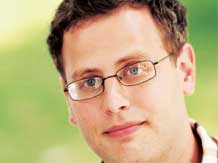[ad_1]
The Nobel-prize-winning work of economic theorists Paul Milgrom and Robert Wilson of Stanford University on how to set up auctions shows how the field is evolving. No longer is economic theory merely a glorified way of using mathematics to tell allegories about the world— now it has practical engineering applications.
This year’s award is well-deserved and long-awaited. In fact, I had predicted Dr Milgrom to win last year; he’s such a virtuoso that it was only a matter of time (Dr Wilson, Milgrom’s thesis advisor, is certainly no slouch either).
Dr Milgrom’s work in finance theory, for example, illustrated why the ever-present fear of trading against someone who knows more than you do tends to make financial markets inefficient.
But it was for auction theory that Dr Milgrom and Dr Wilson won the prize. Auction theory is special because it has direct real-world applications.
Most economic theories are basically mathematical parables. Although they’re written in equations, the variables in those equations only loosely correspond to real-world things that we can measure. For example, Dr Milgrom and co-author Lawrence Glosten’s model of financial-market trading depicts an interaction between informed traders, who understand how much an asset is worth, and market-makers who know less about those assets.
That’s a useful way of thinking about trading, but in the real world it’s not possible to identify these different types of traders (and they generally overlap). So while a model like this illustrates a principle about financial markets, you can’t plug numbers into it and use it to make quantitative predictions, like you can with a model in physics or chemistry.
Auction theory is different. When people, companies or computers bid in an auction, the rules of the game are well-defined and everyone knows how to play. The buyer’s goal at any auction is simple — purchase something for the lowest price possible, as long as you pay no more than the item is worth to you.
Given those rules, economists can use game theory to make very quantitative, precise predictions of how people will bid. And those predictions can be used by the people setting up auctions to make sure that items reliably get sold at good prices to the buyers who really want them.
But getting those predictions right can be very tricky, because real-life auctions can be extremely complex. Each bidder may know only a little information about how much an item is worth, for example, and they may reveal this information to each other during the bidding process. Sometimes sellers want to auction off a bunch of items at the same time. Sometimes bidders try to cheat by collaborating behind the scenes, and so on.
Dr Milgrom and Dr Wilson’s research helped figure out what to do in these complex cases. One of their most impressive achievements was helping the Federal Communications Commission come up with better ways to auction off the rights to broadcast spectrum frequencies for things like mobile communications. Their work has also been applied to electricity sales and allocation of airplane landing slots. Private companies, too, are increasingly reliant on auction theory — Google’s whole business model depends on auctioning ads efficiently, using cutting-edge economic models.
This is a sea change for economics as a discipline. Suddenly, models work not just as allegories but as exact mathematical predictors of human behaviour. In fact, auction theory is just one example of this; matching theory, which won a Nobel in 2012, is another model with wide applications.
And that means that economics is, increasingly, an engineering field. Just as with physics or chemistry, economic theories — a few of them, at least — can create useful technologies for both companies and governments. That’s one reason economists, once relegated to giving policy advice, are now in big demand in the private sector.
As computer systems become ever more sophisticated and ubiquitous, expect this trend to continue. Unlike humans, algorithms are perfectly suited to economic analysis — they know exactly what they want, follow well-defined rules and make few mistakes. The more commerce depends on computers trading with other computers, the more exact and reliable the predictions of economic theory will become.
So expect the Nobel for economics to continue rewarding theorists whose work has engineering applications. Although there have been few new fundamental theories in recent years, the opportunities for theorists to design practical and useful technologies remain vast and unexplored.
Instead of becoming dentists, as John Maynard Keynes famously wished, economists may end up as engineers.
The writer is a Bloomberg Opinion columnist.©Bloomberg
[ad_2]
Source link











